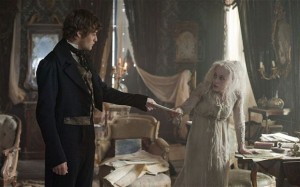
REVIEW: Great Expectations
Crossed fates, class conflict, broken families, vengeance, death and unrequited love. One hundred and fifty years on from its initial publication Charles Dickens’ Great Expectations has lost little of its drama and none of its bleakness. Presented in three parts, the recent BBC production of this canonical text is a visually striking and suitably sombre adaptation.
 Following his encounter with an escaped convict and a series of meetings with a spinster and her adopted daughter, the fortunes of a young orphan, Pip, are irrevocably altered. Given a chance for a life as a gentleman by an anonymous benefactor, Pip leaves behind his humble origins for a wealthy existence in London and the pursuit of his childhood love.
Following his encounter with an escaped convict and a series of meetings with a spinster and her adopted daughter, the fortunes of a young orphan, Pip, are irrevocably altered. Given a chance for a life as a gentleman by an anonymous benefactor, Pip leaves behind his humble origins for a wealthy existence in London and the pursuit of his childhood love.
While screenwriter Sarah Phelps and director Brian Kirk (Game of Thrones) have condensed and omitted certain events and characters from Dickens’ work, the core elements of the story remain. The emphasis on fate, on severed family bonds, the critique of class relations and the inescapable past that haunts its characters are all enduring themes that have contributed to Great Expectations’ lasting appeal.
And although Great Expectations is not short on previous adaptations, there is much to recommend this production. In particular, the nuanced performances of the key cast are worthy of high praise. Ray Winstone’s outwardly menacing turn as the convict Magwitch belies a compassionate selflessness while David Suchet’s role as the lawyer Jaggers allows glimpses of tenderness beneath his stone-faced exterior.
 Likewise, relative newcomers Douglas Booth (whose porcelain-like complexion and striking features would not seem out of place in an adaptation of The Picture of Dorian Gray) and Vanessa Kirby, imbue their respective roles as Pip and Estella with appropriate degrees of cold-heartedness and sincere vulnerability.
Likewise, relative newcomers Douglas Booth (whose porcelain-like complexion and striking features would not seem out of place in an adaptation of The Picture of Dorian Gray) and Vanessa Kirby, imbue their respective roles as Pip and Estella with appropriate degrees of cold-heartedness and sincere vulnerability.
However, it is Gillian Anderson’s casting as Miss Havisham that stands out. Performing the role with a wide-eyed and softly spoken manner Anderson fixes the jilted bride in a state of regressive adolescence; a consequence of her unfulfilled nuptials and a symptom of her desire for revenge. Yet despite her character’s cruelty, it’s a testament to Anderson’s performance that the scene in which Havisham’s fate is finally sealed is also the most heartbreaking.
 The production’s other crowning achievement lies in its intricate visual design. From the blue-grey hues of the opening scene marshlands to the festering interiors of Havisham’s Satis House, to the fog-filled London streets or the death mask that stares down from Jagger’s office wall, the mise en scène of Great Expectations repeatedly constructs a vivid portrait of the decay, duplicity, confusion and mortality which burden its characters. That it makes such a vision (of this well-tread tale) so utterly captivating is perhaps its defining triumph.
The production’s other crowning achievement lies in its intricate visual design. From the blue-grey hues of the opening scene marshlands to the festering interiors of Havisham’s Satis House, to the fog-filled London streets or the death mask that stares down from Jagger’s office wall, the mise en scène of Great Expectations repeatedly constructs a vivid portrait of the decay, duplicity, confusion and mortality which burden its characters. That it makes such a vision (of this well-tread tale) so utterly captivating is perhaps its defining triumph.





RSS feed for comments on this post. TrackBack URI